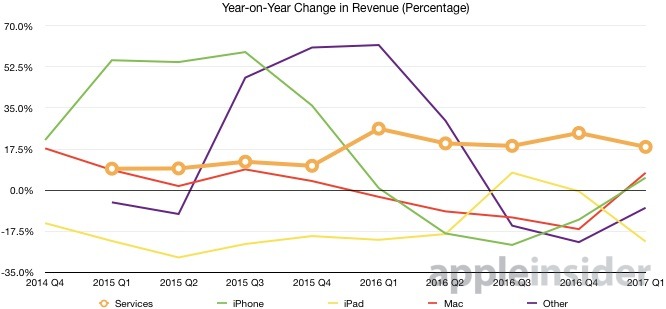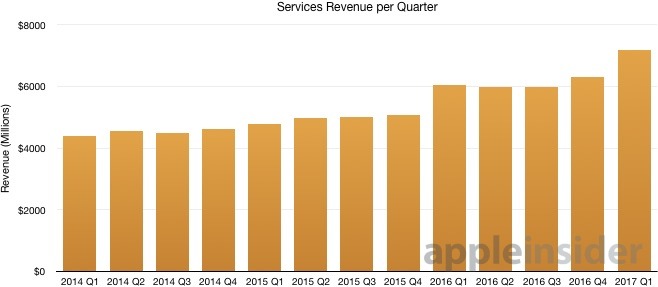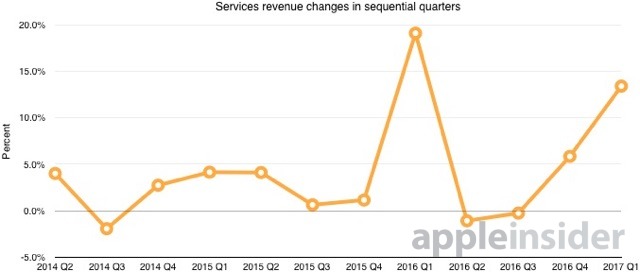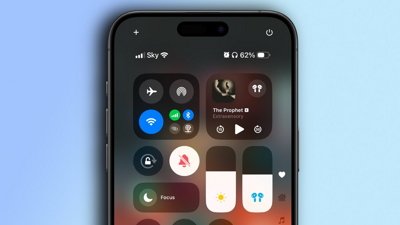The encompassing "Services" business has proven to be a reliable source of income growth for Apple, but its tremendous performance — Â accomplished during an overall company sales decline — Â can be difficult to visualize. AppleInsider offers a closer look at the booming segment Apple believes will double over the next four years.
Apple announced this week that its Services arm generated $7.17 billion in revenue, beating the previous quarter's figure by 13 percent, as well as representing an 18-percent year-on-year growth.
Apple Chief Executive Tim Cook revealed during his company's earnings conference call that Services is on track to become the size of a Fortune 100 company by the end of the year.
The growth is also quite stable when compared against the growth rates of other parts of the company. AppleInsider's analysis of Apple quarterly reports shows the Services arm has consistently offered positive growth compared to the same quarter in the previous year, ranging between 9.1 percent and 26.2 percent over the last two years, ever since it became its own revenue category in the financial results.
By comparison, the iPhone, iPad, Mac, and "Other" revenue categories have all drifted into negative year-on-year growth in the last two years, though in the case of the iPhone and "Other" groups, both have also demonstrated revenue growth exceeding 50 percent.
While Services seems to be steadily growing when put against its revenue levels of the year previously, a comparison of sequential quarters shows it does contract, but only by small amounts. Worse performance by Services compared to the previous quarter occurred in three of the last 12 quarters, though in each case revenue shrank by less than 2 percent.
It is likely Apple will continue to see consistent growth in Services for quite some time, a belief shared by financial analysts. It is speculated revenue will grow 17 percent every year until 2021, with Ben Schachter of Macquarie Securities calling the App Store, a core component of Services, "one of the best business models ever created."
During the first quarter of fiscal year 2017, the App Store generated $3 billion in purchases in December, making it the store's best month to date, with AppleCare and storage services also setting new records. Apple Pay, also classified under Services, has seen user numbers triple in the last year, with a 500 percent year-on-year increase in transaction volume.
 Malcolm Owen
Malcolm Owen
















 AppleInsider Staff
AppleInsider Staff

 Oliver Haslam
Oliver Haslam
 Andrew O'Hara
Andrew O'Hara

 Wesley Hilliard
Wesley Hilliard
 William Gallagher
William Gallagher
 Christine McKee
Christine McKee








6 Comments
I think there's a huge upside and untapped potential in services that Apple is just starting to harvest value from today. The biggest revenue generator today, as Rogifan_new pointed out, is largely driven by content curation and not Apple services that involve third party services level contribution and collaboration. Apple Pay is a notable exception. A richer services ecosystem would, for example, include things like third party service extensions to Siri to tie in domain specific syntax and semantics, e.g., Siri for call center support, Siri for emergency dispatcher support, Siri live language translation, Siri for assisted living, Siri for domain specific education, Siri for the US Navy, etc. Not knocking Apple at all, just pointing out that a glass half full perspective of where Apple is with services reveals a huge upside potential that dwarfs the content curation market they are serving today with great success. They're in good shape but just need to execute with the right strategic-tactical balance to prevail over strong rivals like Google and Amazon.
Apple is just putting the base foundation in regards to Services. I don't think they are really exploiting it yet. There is a great untapped potential, which I don't think Apple is unaware of. Right now it is mostly cut of little bits here and there, however you have to remember, Apple is not doing much with it at the moment - they are mostly just sitting on this one (despite the 7 billion, yes I know it's crazy). Wait until Apple is seriously getting aggressive. As I said - lots of future potential.
18% growth * four years is the double Tim Cook predicts. Thank you, rule of 72.
When I think of services I recall from my software startup days the general rule of valuation VCs apply; one-time revenue gets you a 4x valuation, recurring, because it's more predictable, gets you 7x. Sure enough, look at NFLX. Its market cap represents 7x its revenue (6.84x to be precise). Sirius/XM is valued at 4.69x sales, but it's got big capital expenses in launching and maintaining a fleet of satellites, in addition to content costs. NFLX doesn't have that extra expense category.
Apple, as predominately a hardware company, is currently valued at 3.14x sales, not even attaining the 4x normally attributed. That's because it's not growing rapidly any longer, and because there's believed to be a lot of risk to leading edge tech companies; risk they'll be obsoleted by some upstart. As Apple continues to grow its services revenue streams that risk will be perceived as less, because its revenue sources will be more diversified, because its hardware/software/ecosystem will be strengthened further by the fact users will become accustomed to paying monthly for some parts of the overall Apple experience, and because its ecosystem will cover more aspects of each user's life, making switching even more onerous. As a result, Apple's valuation will increase not only due to overall increasing revenues and profits, but also due to a gradual expansion of its price/sales ratio.
Where are all the haters who want Tim's head on a stick now?
this never happened under Jobs. He NEVER would have run a successful cloud services business.